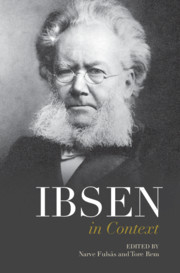Book contents
- Ibsen in Context
- Ibsen in Context
- Copyright page
- Contents
- Figures
- Contributors
- Preface
- Notes on the text
- Chronology
- Part I Life and Career
- Part II Culture and Society
- Part III Scandinavian Reception
- Part IV Internationalization
- Chapter 17 Copyright
- Chapter 18 Censorship
- Chapter 19 German Reception
- Chapter 20 British Reception
- Chapter 21 French Reception
- Chapter 22 Parodies
- Chapter 23 Early Globalization
- Part V Afterlives
- Further Reading
- Index
Chapter 19 - German Reception
from Part IV - Internationalization
Published online by Cambridge University Press: 23 April 2021
- Ibsen in Context
- Ibsen in Context
- Copyright page
- Contents
- Figures
- Contributors
- Preface
- Notes on the text
- Chronology
- Part I Life and Career
- Part II Culture and Society
- Part III Scandinavian Reception
- Part IV Internationalization
- Chapter 17 Copyright
- Chapter 18 Censorship
- Chapter 19 German Reception
- Chapter 20 British Reception
- Chapter 21 French Reception
- Chapter 22 Parodies
- Chapter 23 Early Globalization
- Part V Afterlives
- Further Reading
- Index
Summary
Towards the end of the nineteenth century in Germany, Ibsen had become a household name for promoting sociocultural change. Different avant-garde movements such as the Freie Bühne and the prominent theatre maker Max Reinhardt placed Ibsen’s plays at the centre of theatrical innovation. The twentieth century saw Ibsen represented in newly imagined theatre spaces, early silent cinema and later the Regietheater of Peter Stein and Peter Zadek. This German tradition continues until the present day when Thomas Ostermeier’s touring productions have become key reference points for theatre makers and scholars alike. But what often appears as a continuous success story reveals itself as a complex performance history of setbacks, struggles and reactionary reappropriations, such as by the film industry of the Third Reich. This account of Ibsen’s German reception draws out the nuanced and often contradictory dynamics that made Ibsen one of the most important dramatists of German theatre.
- Type
- Chapter
- Information
- Ibsen in Context , pp. 166 - 174Publisher: Cambridge University PressPrint publication year: 2021
- 1
- Cited by

